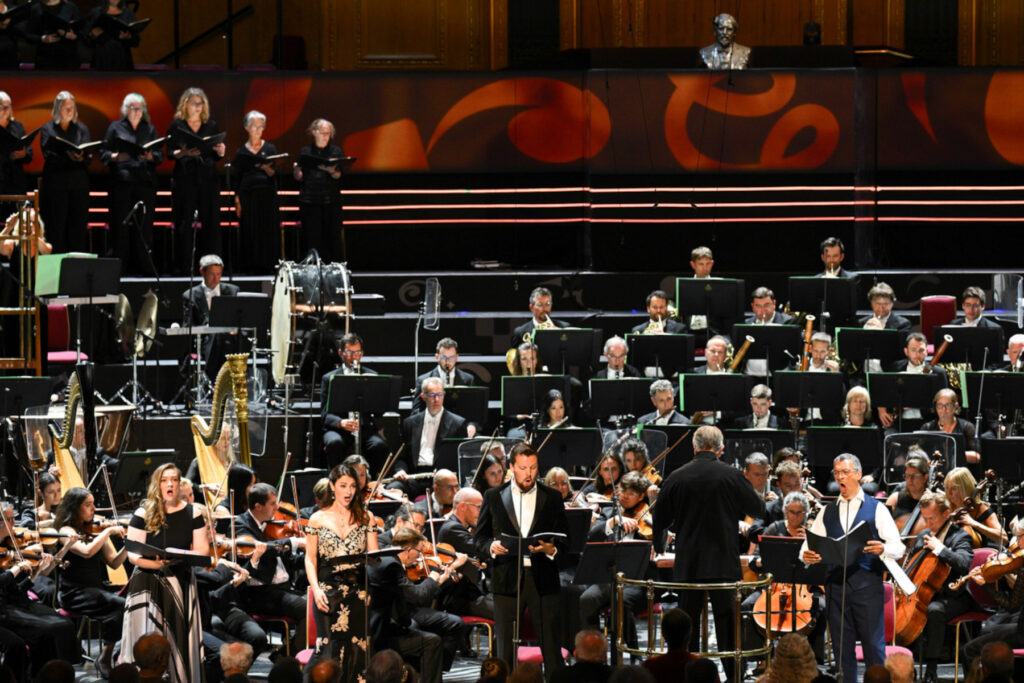Hailed by many commentators as a choral masterpiece, Delius’s A Mass of Life is an expansive choral extravaganza taking inspiration from Friedrich Nietzsche’s Thus Spake Zarathustra. The composer interprets the writer’s ideas as a paean to life, a celebration of the triumphant human spirit in the face of death. Never mind high-flown ideas on Übermensch and the mastery of self, Delius pays homage more to the music of Wagner and the entire German romantic sound world to create his most ambitious score which Neville Cardus once considered “the most beautiful choral work ever written”.
With its misleading title and rejecting any religious impulse (Delius was a staunch atheist), the ‘Mass’is one of those rare unclassifiable creations combining elementsofopera, orchestral tone poem, ballet music and, not least, some of the most demanding choral writing from the beginning of the last century. Such are its challenges that questions were raised after its 1909 premiere under the direction of Mr. Thomas Beecham about the “reconciliation of new ideas with the capabilities of the human voice”. But here, the combined forces of BBC Symphony Chorus and the London Philharmonic Choir (some 250 voices), left one in no doubt as to their collective capabilities.

And it’s not exactly core repertoire (it was last sung at the Proms in 1988 under Sir Charles Groves), so all the more credit for these well drilled choirs that had the measure of the work’s 100-minute span, in particular its exultant opening double choir number, a stirring invocation to the power of the human will. If the choral and orchestral writing is overblown, the singing here under Sir Mark Elder was wondrously energetic with full-throated sopranos just occasionally straining for their highest pitches which include a couple of top Cs. But the sense of commitment and exhilaration were exceptional, the singing inhabiting a sort of breathless fervour, voices seemingly identifying with the notion of man as superman. Stamina was there too for ‘Herauf! nun herauf!’ forming part of the opening of Part Two. Okay, not every top A resounded with unimpeachable clarity. But if this was an exercise in stamina, then the chorus could hardly be faulted as they did their utmost to soar over an orchestra bolstered by seven horns and triple woodwind. Women’s voices brought clarity to their wordless lines with crisply articulated “la la las” while the full chorus was suitably buoyant and fleet-footed for ‘Das ist ein Tanz’, their frolicking “over dale and hill” gloriously evocative of living life to the full. Nothing muddy in its dense textures, and basses later bringing sympathetic warmth to their chorale tune at ‘O Mensch! Gib Acht!’, the midnight bell with its promise of eternity.
Occupying the lion’s share of the solo allocation was the go-to baritone of choice Roderick Williams who, with mezzo Claudia Huckle, has recorded this work with Elder (LAWO Classics; 2023). If ever a soloist can make sense of Nietzsche’s lofty pronouncements, it’s Williams, who brought much colourful shading and character to Zarathustra’s moods – variously cavorting, intimate (his ‘Song of the Lyre’ was utterly enchanting) and resignation. He may not have the most powerful voice, but there’s no sense of struggle here, the technique is flawless and the high G, evoking a lover’s soul near the close of ‘The Night Song’, was impressive.
Each of the other soloists was expressive and thoroughly communicative with Jennifer Davis in radiant form, Claudia Huckle voluptuous in her soliloquy to Zarathustra and an ardent David Butt Philip. No difficulties with projection over Delius’ extravagant scoring and here the players of the BBC Symphony Orchestra were on spectacular form with much sensitive and at times sensuous collaboration. Part Two abounds in some ear-catching moments, not least its atmospheric opening where horns, high up in the gallery, brought Alpine evocations – indicating that the natural world, as well as Nietzsche, was a vital source of inspiration. Elsewhere, there were many distinctive woodwind contributions, including a beguiling trio of oboe, cor anglais and bass oboe (played with melting beauty) which underlined the serenity of ‘At noon in the meadows’.
For those who consider the work a collection of episodic movements strung together by the moonshine of deep midnights and higher men, Elder made a fine case for a work imbued with the spirit of tender melancholy and wistfulness. It’s fair to say that Delius’s characteristic nostalgia or wistful resignation don’t necessarily square with Nietzsche’s free-thinking concept of man’s independence and his injunction to “Be hard, my brethren”. No matter of the composer’s dreaming, the self-indulgent visions, performances as commanding as this demand that Delius be heard more often. Moonshine or not, this performance was an outstanding achievement, and if not “the most beautiful choral work ever written”, Elder got close to converting me to its beauties.
David Truslove
Elder Conducts ‘A Mass of Life’ (BBC Proms 2025)
Delius – A Mass of Life (sung in German to a text by Friedrich Nietzsche with English surtitles)
Jennifer Davis (soprano); Claudia Huckle (mezzo-soprano); David Butt Philip (tenor), Roderick Williams (baritone), BBC Symphony Chorus; London Philharmonic Choir; BBC Symphony Orchestra, Sir Mark Elder (conductor).
Royal Albert Hall, London, 18 August 2025
All photos © Chris Christodoulou